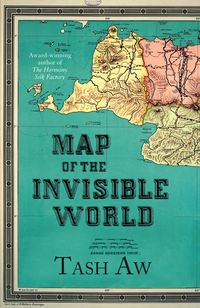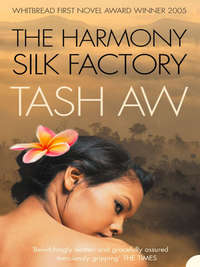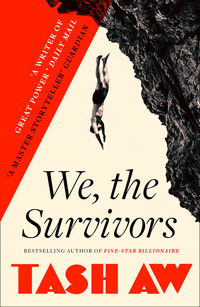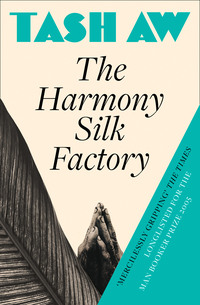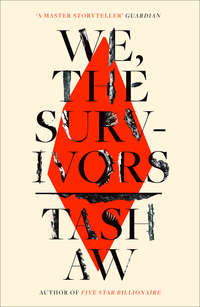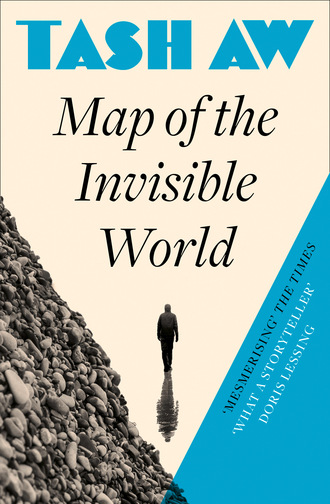
Полная версия
Map of the Invisible World
‘Hello, Sailor,’ she said.
‘My dear god,’ one of the men said, leaning back in his chair, ‘it’s Jakarta Jane, sweetheart of the forces. To what do we owe this most splendid honour?’
‘Nothing, just thought I’d pop by to say hello,’ Margaret said, easing herself into a chair.
‘I’ve never known Margaret Bates to “pop by” to say hello. What do you want?’ He had an open smile, his youthful face surprisingly creased with lines. He was a thick-set man with broad hairy forearms and thick agricultural fingers that looked thoroughly unsuited to writing or typing.
‘Do I detect a note of cynicism there, Mick?’
‘Not a note, a whole goddamn symphony. Rudy – get Margaret a beer, will you? And one for yourself too. In fact, one for everyone. We need no further excuse for a beer now that Margaret Bates is here.’
The other man, a stout young Indonesian, retrieved three bottles of Krusovice from a fridge that stood against a bare wall like a piece of modern art. He brought one over to Margaret, bowing slightly as he did so.
‘Hey, Rudy, did you know that Sukarno himself tried to get her to bed? He had such a hard-on for her.’
‘Do shut up, Mick.’ Margaret smiled and accepted the cold bottle of beer. Her headache had faded to a dull throb and she was feeling hot, dehydrated. ‘That was so long ago.’
‘Ah-ha! You admit it!’
She turned to Rudy. ‘Just ignore him. It’s all rumours. You know what you boys are like, forever looking for scandal. Journalists will be journalists – especially if they’re Australian.’
Rudy shrugged his shoulders indifferently, but continued looking at Margaret.
‘I had another job back then, it was different. I met the President a few times at official functions,’ Margaret began to explain, without knowing why she felt the need to. ‘He seemed to like me, and he remembered me. You know what powers of memory he has. I was friendly with his staff, so journalists used to ask me to arrange appointments at the Palace. All these dirty boys–’
Mick put the bottle to his lips with comic lasciviousness, his tongue curling outwards.
‘–started a rumour. You know the President’s reputation with women. Well, just for the record, he was always very correct with me.’
‘Um-hmm,’ grunted Mick as he drank his beer.
‘Very pleased to make your acquaintance anyway,’ Rudy said before returning to his typing.
‘So what do you need from me this time, darling?’ Mick asked.
Margaret picked up a slim, loosely bound book from Mick’s desk and began flicking through it – a collection of Chairil Anwar’s translations of Rilke. ‘Do you find him faithful to the original?’
‘He’s better with Gide. With Rilke it’s like he’s trying too hard, like he wants to be in tune with Rilke. There’s no such clunkiness with Gide, it’s like they know each other. Anwar would have been great with Rimbaud. They’ve so much in common – that unfettered lifestyle, don’t-give-a-damn hair…Shame he never discovered him. They’d have been the perfect couple.’
‘Bill Schneider accosted me at the Hotel Java last night.’
Mick leant back in his chair. ‘Damn, I thought you’d come to talk about Rilke. What the hell were you doing with that man? Bill Schneider – even the name makes me want to retch.’
‘He gave me this.’ She handed over the page which she had torn from the newspaper. ‘Have you heard anything?’
He looked at the page briefly. ‘What’s so special? There’s a civil war brewing, darling. Commies are being arrested and killed all the time – even in godforsaken little islands. Where is Perdo? Never even heard of it.’
‘Look at the picture carefully. There’s a European in there. Just there,’ she said, stabbing at a spot on the page with her finger. ‘That’s not usual. There aren’t that many foreigners hanging around in Indonesia, Mick. One of your sources must know something about this.’
Mick picked up the paper and looked at it again, holding it up at an angle to catch the dim light. ‘Why did Bill Schneider give you this?’
Margaret shrugged. ‘Beats me.’
‘It’s someone you know, isn’t it?’
‘Uh-uh,’ Margaret shook her head. ‘No idea who it is.’ She did not know why she lied.
Mick smiled as he put the bottle of beer to his mouth. ‘Hmmm.’
‘Honest,’ Margaret said, trying to sound bright (she was good at sounding bright, she told herself, she was even better at being flippant). She retrieved the piece of paper and re-folded it neatly. ‘I just thought, well, this poor guy’s out there, stranded, his Embassy probably doesn’t even know, he’s about to be flung in jail or even worse, a shallow grave along with lots of communists. I guess Schneider just thought that with the contacts I have – well, used to have – I might be able to do something. But I can’t. It’s not the same any more.’
Mick did not reply; a moment of silence passed between them, the staccato tapping of Rudy’s typewriter the only noise in the airless afternoon. Margaret looked down at the folded piece of paper in her lap. The newsprint was blurring and the paper itself was becoming oily and limp from the humidity and the moisture on her fingertips. She wanted to reach for her bottle of beer, but suddenly the simple act of stretching out for it seemed impossibly difficult. Her head began to hurt again, the heavy numbness giving way once more to waves of stabbing pain in her temples. ‘I mean,’ she said at last, quietly, ‘I just don’t get mixed up in that kind of thing any more.’
Mick smiled and said, ‘Your beer’s getting warm.’
‘Please, Mick, can you help me? I need to find this man. I feel I need to do something.’
‘Dear old Margaret, always the do-gooder.’ He frowned and ran both hands through his dark wavy hair, rubbing his scalp as if he had an itch. ‘I don’t know, it’s getting difficult for our guys to gather information. Even our local fixers get in trouble with the army. There are soldiers everywhere, looking for trouble. Worst thing is that we don’t have enough cash to bribe everyone. We haven’t got enough money coming through from the US channels. CBS doesn’t use me any more, the BBC’s gone silent. ARTC are the only ones coming up with the goods for me right now. I just don’t know, Margaret.’
‘Please.’
Mick sighed.
‘For old times?’
‘We never had any old times, you heartbreaker.’
She stood up and tried hard to smile. ‘Oh, we would have gotten married and had twelve kids, if only you didn’t’ – she mouthed – ‘like boys.’
‘Oh, you wound me. I die, I faint, I fail.’
‘Truth hurts. Call me.’
She made her way slowly back through the adjacent building. There were more people about now, neatly dressed office workers carrying piles of papers as they walked unhurriedly across the lobby of the building. They glanced at Margaret with sleepy, bloodshot eyes. Some of the women were wearing the jilbab, their heads covered in scarves that came down to their waists, shrouding their slight torsos and revealing only their calm powdered faces. Margaret became aware that the squeaking of her sneakers was the only noise she could hear echoing in the cool emptiness of the space. She could hear no one else’s footsteps, and even the distant drone of the air conditioning had fallen silent.
Outside, the city was white and dusty with heat. She put on her sunglasses and began to walk. ‘Hey, lady,’ men called out, ringing the bells of their becaks to get her attention. She moved away, ignoring them. She wanted to walk; she wanted to move her body and clear her mind and not succumb to this immovable pain in her head. She continued past the dirty white façade of the Catholic cathedral, its spires rising forlornly into the sky. There was a thin patch of fresh whitewash on the walls next to the entrance, but she could still read the messy red graffiti underneath: Crush Christian Imperialists.
‘Hey, lady, hey,’ the becak drivers called. ‘Hey, pretty lady. Oi! ’ A group of three or four of them followed her in their shaded rickshaws, shouting incessantly. Suddenly their cries were all she could hear. The sound of the cars and the buses and scooters faded into a vague, distant roar, like the sound of the sea as you approach the coast but cannot yet see the water. She had to get away from these men, she thought, and crossed the road, wading calmly into the traffic, picking her way westwards to the barren expanse of Merdeka Square. She headed towards the construction site of the soon-to-be National Monument. The gigantic column was pushing slowly into the sky, its thick base shrouded in scaffolding. Monstrous pieces of machinery lay scattered around it, silent and unused like ruins of a lost civilisation. The earth in the square was bare and easily turned to mud by the heavy rains of the monsoon, but now, after a few months without rain, it was crumbling to dust, and she kicked up little red clouds as she walked briskly along in the heavy heat. It felt like a desert here, Margaret thought, uninhabitable by man.
She continued briskly, feeling the heat on her head. Stupid to come out without a hat, she thought, but she was not a delicate white flower that wilted under the sun. She marched on through this deserted island in the middle of the swirling city, trying to ignore her headache. A mangy dog trotted alongside her for a few moments and then sloped off to find shelter. In the distance, in the meagre shade of a spindly acacia, she noticed two boys, shirtless, their backs propped up against the tree trunk. She was not in the mood for hassle, but a quick glance confirmed that there was nowhere to go: all around her there was just a great emptiness with no pathways to divert her trajectory, no cover, no excuse to change direction. Besides, she thought, if she changed tack now they would spot her and know that she was avoiding them, and then they would come after her. She knew this for certain; she had lived here so long and knew these people so well that she could predict what would happen. The best thing to do was to carry on as if they were not there. They might be too lazy or tired to harass her. They were just kids: what could they do? In any case she must show that she was not afraid.
‘Hey, cutey,’ they shouted as she went past. She noticed at once that they did not call her ‘Auntie’ or ‘Mother’ or any other respectful term by which she was often addressed by young men. She should have been flattered but wasn’t; she carried on briskly. Instantly, they were at her side, flanking her as she lengthened her stride. Their frames were slight, even fragile at first glance, yet Margaret saw that they had the expressions and wiry musculature of older boys. Quickly she determined their age: fourteen or fifteen, old enough to be dangerous.
‘Hey – Dutch? British? American? Give us money, US dollars.’ They spoke with the rough accents of the Bimanese or Sasaks; these boys were from the outer islands, not Jakarta.
She continued looking straight ahead. ‘I don’t have any money with me. If I did I would give you some, but I don’t. Now go away, leave me alone.’
Thrown by her fluency in Indonesian, they were quiet for a moment. ‘One dollar,’ one of them said, holding up his index finger. ‘Just one dollar.’
‘No.’
‘OK, rupiah. You have rupiah.’
‘I told you, I have no money.’ They were still a long way from the edge of the square, a long way from the sea of traffic in the distance.
The first boy stepped in front of her and stopped dead. ‘You’re lying.’
He stood very close to her, looking straight into her face. He had a scar running across his forehead, a purple-white streak against the almost iridescent bronze of his skin. The pungent odour of his sweat filled Margaret’s nostrils and she could almost feel the sticky heat from his body. She looked him straight in the eye and was glad for the extra protection of her sunglasses. ‘I am telling you to leave me alone.’
His face broke into an ugly sneer, his lips parting to reveal surprisingly strong white teeth. ‘Why?’
‘Because I say so.’
‘So what? Give me rupiah.’
‘No.’
Out of the corner of her eye she saw another three or four youths jogging towards them, street kids, just like these two, shirtless and barefoot. She moved to one side and resumed walking, faster now: she had to get to the edge of the square.
There were bodies around her, but she kept striving for the road, for the noise of the traffic. Someone reached out and touched her, a hot clammy hand on her bare forearm. Don’t run, she told herself, don’t run. There was a tug at her shirt, then a pinch on the side of her stomach. She broke into a run, kicking up a cloud of dust. The low roar of the traffic grew louder and she heard someone shout out behind her, a single sharp adolescent’s cry, but she did not turn back until she had reached the side of the great wide road with the comforting cacophony before her. She was breathing hard: she could not remember the last time she had had to run. She hurried across the road, enjoying the angry beeping of the scooters, and when she reached the other side she looked across at the square. Suddenly it seemed far away and unthreatening, shrouded in a veil of dust.
She blinked. The sun had begun to fall from its midday peak, the light becoming silvery and blurred through the thick haze of exhaust fumes and dust. The shapes of the boys in the distance shimmered in the heat, floating, it seemed, on a watery surface. ‘Margaret Bates,’ she said aloud, wanting to hear her voice: it sounded hoarse and slightly shaky. ‘Pull yourself together. Right now.’ It was nothing serious, she told herself. You let your guard down for a second and when you do that in a city like Jakarta you’ll get into scrapes, Margaret Bates, you know that full well. It’s no big deal.
They were just boys, just boys.
She continued walking for a few hundred yards until she reached an unkempt lawn that lay like a haphazardly placed rug in front of a large, handsome villa. The white paint of the house had faded to a dirty grey; the columns that divided its façade into neat squares were carved with graffiti, and swiftlets nested in the eaves. Shaded by rain trees, the building felt ancient and damp, and the cool darkness of its deep verandas instantly made Margaret feel better.
‘Good afternoon,’ the woman at the reception said to her, standing up quickly as if she recognised Margaret, as if she had been expecting her.
‘I was wondering if I could look through the old issues of whatever newspapers you have – not that old, in fact, quite recent.’
‘Of course,’ the woman said. She wore a neat beige knee-length skirt and a white blouse. Pinned on her shirt was a plastic brooch of a bumblebee with a smiley face, and in her perfectly straight hair there was a hair-band of the same yellow as the bumblebee’s cheerful cheeks. ‘This way, please.’
Margaret followed her into a large sombre room that smelled of camphor and damp wood. No one else was in the reading room, and most of the bookshelves were empty, or else stacked with nondescript cardboard boxes. There were no windows on the ground floor; above them was a narrow gallery decorated with cheap modern oil paintings of cockfights and buffaloes and paddy fields. The arched windows of the gallery were dirty and stained, and panels of glass missing here and there.
‘It is all ready for you, over there,’ the woman said, pointing at a recess at the far end of the room.
‘But I need something quite specific,’ Margaret said.
The woman smiled a broad toothy smile that looked unnervingly like the bumblebee’s. ‘You will find it all there.’
The alcove was in fact larger than she had thought, and dominated by a table on top of which various newspapers had been arranged in neat piles: the Harian Rakyat, Indonesia Raya, Sinar Harapan. It looked as if they had been specially laid out in the hope that she would come along and consult them. She settled down to a pile of Harian Rakyat from the mid-fifties. Ten years did not seem like such a long time and yet the font and indeed the writing style seemed archaic to her, so innocent and free. The pages were brittle and yellowed and foxed by the humidity, and the few pictures that appeared in them were as blurred as Impressionist paintings. She squinted in the dim light: maybe she needed glasses. Every time she came upon an article on the repatriation of Dutch citizens she paused, searching for names or faces. She had no idea which names or faces she was looking for, but she knew that sooner or later she would come across something that would help her.
‘Here you are, madam.’ Margaret looked up and saw the bumblebee smiling at her. The woman put a glass of almost fluorescent iced syrup on the table next to Margaret and went away again. Margaret hesitated, but she was suddenly very thirsty. She sipped it cautiously at first, and, finding it not as sweet as it looked, finished it in a few gulps. She let a piece of ice slip into her mouth and sucked on it as she continued looking through the newspapers, her tongue feeling pleasantly numb. She worked her way briskly through each pile, pausing occasionally.
Repatriation Continues
JAKARTA, 6 December 1950 – The repatriation of Dutch families from Indonesia is continuing in earnest. Numbers of Dutch nationals leaving Indonesia are estimated to be on the increase. Today a special KLM flight left from Halim Perdana Kusumah airport filled with the latest families departing for the Netherlands. Most of them are happy to be leaving Indonesia, just as we are that they are leaving. Photo: Mother and child wait to board plane. Isn’t that a cute Teddy Bear! Don’t cry Teddy Bear!
Revolt in Ambon
AMBON, 16 January 1951 – Following the disbanding of the colonial army in July last year, a small number of former soldiers have refused to join the new Armed Forces of Indonesia. It is estimated that no more than 40 of these traitors have turned down the chance to participate in President Sukarno’s building of the great Republic of Indonesia and arrangements have been made to ship them away to the Netherlands. ‘I have to leave my family behind and I will be very lonely in the Netherlands, but I have no future in Indonesia,’ says one of these traitors whom we will only call Tomy To Tomy and his friends we say Good Riddance!
Death in the Plantations
Special Report by Affandi Suprianto
NUSA PERDO, 2 December 1953 – In this little-known corner of Indonesia a war is being fought to rid the country of the last vestiges of Dutch colonialism. On a 200-hectare Kayuputih plantation…a battle that symbolises the hardship of ordinary Indonesians…neo-slavery and oppression…Following the death of his daughter Santi, aged 4, plantation worker Adrus Utina…concession-owner Joos van Eerde…funeral costs…pleas unanswered…misunderstanding…subsequent dismissal…fellow workers protested…all rewarded with dismissal…burning of warehouses…accidental shooting…ultimatum…following morning the van Eerde family fled the compound…plantation under the control of the workers’ co-operative…revolution beginning even in outlying islands…
My Wonderful Life: Renowned Artist Jos Smit talks about Heartache and Happiness
BALI, 19 January 1957 – He has had successful exhibitions in Sumatra and his beloved Bandung, and his reputation is now sky-high. Collectors of his work are said to include the President himself, but acclaimed artist Jos Smit’s career would never have begun if he had not come to Indonesia. Now settled in Bali, he is convinced that he has found his spiritual home. ‘I suppose for me it is what Tahiti was to Gauguin – beautiful colours and light, not like the grey grey grey of Holland…tradition of painting…many famous Westerners, Spies and Bonnet, whom everyone knows but other minor figures like Karl de Willigen too.’ As for his nationality, he is utterly sure that he made the right choice, even though he sometimes feels sad for the loss of friends. ‘I took an Indonesian passport as soon as I could, in 1950. All other Dutch Indonesians should have done the same but they didn’t have the courage. I had no hesitation. For nearly ten years I have only spoken Bahasa Indonesia. I can’t even speak Dutch any more! The only regret I have is that sometimes I speak to people and I can see in their eyes that they think I’m Dutch, not Indonesian.’ When asked about other former Dutch contacts who might still be in Indonesia, such as de Willigen, he says, ‘I have had no contact with them for years. They are probably all back in Holland, or else dead.’
United States Peace Programme-aid package for Indonesian Army
JAKARTA, 6 September 1958 – Photo: President Sukarno attends reception at US Embassy in Jakarta (L-R, the President, Ambassador Howard P. Jones, General Nasution).
Margaret examined the hazy image. In the background there hovered a number of people, including the unmistakeable figure of Bill Schneider, his already-thinning hair neatly combed, eyes alert, watching every detail. He looked exactly the same as he did today; clearly, life in the tropics suited him.
She rubbed her eyes. It was getting late, the room darkening quickly in the blue twilight. She rearranged the newspapers haphazardly and went to find the librarian. The reception desk was empty, cleared completely of papers and books. ‘Hello,’ Margaret called, but no one answered. The swiftlets that nested in the eaves of the roof were coming alive in the gathering dusk, fluttering from their nests in search of insects. Margaret left the building and began the long walk home. Her head no longer hurt and she felt ready to face the city.
She walked through the narrow alleys of Glodok, the air filled with the aroma of incense and cooking and blocked drains: a powerful, even heady combination. Never go there at night, foreigners cautioned, but Margaret always found it pleasant here, especially in the evenings. The ceaseless sounds of human industry – the clatter of pans and dishes, the dull thud of sacks unloading from lorries, the indistinct clinking of hardware – comforted her, for in the half-darkness it was easy to imagine that here, in this warren of streets, the city had not changed in two hundred years. Trapped in the maze of dead-ends and unnamed streets, she could not see tower blocks or concrete monuments or glass statues; and under the cover of night the decay of the buildings around her became less noticeable, making the city seem gentler, more human.
Further north the old square was quiet and empty now, the colonnades of the great buildings filled with a deep gloom. The soldiers she had seen earlier were gone, replaced by people trying to find a place to sleep. Suddenly she was eager to get home, and glad she was not far. She longed for a cold shower, a proper modern American one with powerful jets of water that would strip the dust and grime from her hair and face and make her skin tingle when she stepped into it, but instead she knew that she would have to stand under the dribble of her makeshift shower that consisted of a hose and a watering can. The water would be tepid, heated in its thin pipe by the sun, but still, it would be good enough. And then she would have a whisky, a strong one, and then she would fall asleep and forget about today, about everything.
She hurried along the final stretch until she reached the low wooden gate in front of her house. She could hear the distant ringing of her telephone as she fumbled in the dark for her keys, running across the yard. It was not until she was almost at the front door that she realised there was someone there, a body slumped on the steps. It was a boy, a teenager, crouched over in an almost foetal position. Margaret came up close and saw that he was asleep. Disturbed by the insistent ring of the telephone, he began to stir. He shifted uncomfortably; across his white T-shirt the word BERKELEY was emblazoned in large letters. Though closed, his eyelids trembled lightly, rapidly, as if troubled by dreams.
Конец ознакомительного фрагмента.
Текст предоставлен ООО «ЛитРес».
Прочитайте эту книгу целиком, купив полную легальную версию на ЛитРес.


